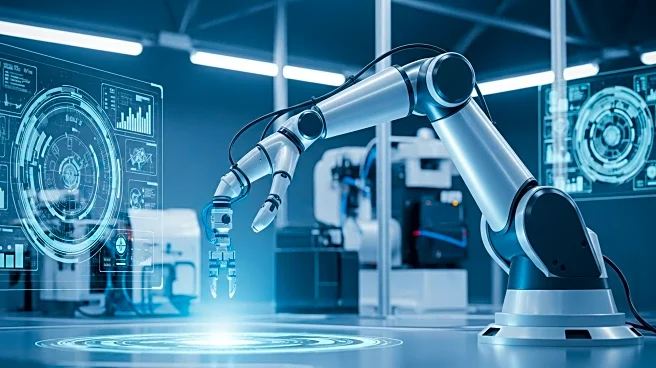What's Happening?
AI agents, more advanced than traditional chatbots, are being increasingly integrated into business operations to autonomously execute complex tasks. These digital employees are designed to enhance productivity and drive digital transformation across various industries. According to industry experts, AI agents are becoming central to reconstructing organizational forms and revolutionizing productivity. Companies like Baidu are leading this shift by launching AI-powered digital employees in roles such as marketing managers and product managers. The market for AI agent marketing and sales in China is projected to grow significantly, indicating a broader trend towards AI-driven workforce solutions.
Why It's Important?
The integration of AI agents into business operations represents a significant shift in workforce dynamics, potentially automating up to 50% of business decisions by 2027, according to Gartner. This could lead to increased efficiency and reduced reliance on human labor for repetitive tasks, allowing employees to focus on more creative and strategic work. The rise of AI agents could also reshape industries by creating new employment opportunities and transforming traditional job roles. As AI agents continue to evolve, they are expected to play a crucial role in enhancing decision-making processes and operational efficiency across sectors.
What's Next?
As AI agents continue to develop, businesses are likely to expand their use across various fields, including education, finance, and consumer goods. Companies may increasingly rely on AI agents to handle complex analysis and data retrieval, further integrating them into decision-making processes. This could lead to a broader adoption of AI-driven solutions, prompting businesses to rethink their workforce strategies and invest in AI technologies. The ongoing evolution of AI agents may also spur innovation in AI applications, driving further advancements in digital transformation.
Beyond the Headlines
The rise of AI agents raises ethical and legal considerations, particularly regarding job displacement and data privacy. As AI agents take on more roles traditionally held by humans, there may be concerns about the impact on employment and the need for new regulations to address these changes. Additionally, the use of AI agents in decision-making processes could lead to questions about accountability and transparency, necessitating a reevaluation of existing policies and practices.










